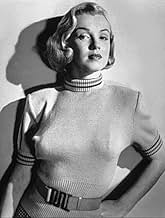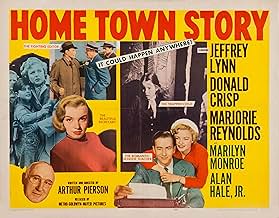Aggiungi una trama nella tua linguaAfter failing to be re-elected, politician Blake Washburn returns home and becomes editor of the local newspaper. When he notices the influence the paper has on the public, he uses it to app... Leggi tuttoAfter failing to be re-elected, politician Blake Washburn returns home and becomes editor of the local newspaper. When he notices the influence the paper has on the public, he uses it to appeal to potential voters in the next election.After failing to be re-elected, politician Blake Washburn returns home and becomes editor of the local newspaper. When he notices the influence the paper has on the public, he uses it to appeal to potential voters in the next election.
- Katie Washburn
- (as Melinda Plowman)
- Hospital Nurse
- (non citato nei titoli originali)
- Jimmy
- (non citato nei titoli originali)
- Don
- (non citato nei titoli originali)
Recensioni in evidenza
This unreleased GM inhouse movie was on TV as a late night movie recently (probably because it had two minutes of yet-to-be-a-star Marilyn Monroe in it), it was so awful I had to find out who wrote, directed and produced it. As I said, it was produced by GM - the writer and director was Arthur Pierson. Four years later Pierson would direct "Born In Freedom: The Story of Colonel Drake", a 30 minute movie about the beginning of the oil industry. I had read how US corporations produced a lot of these propaganda films (as well as books etc.) in the 1950's and tried to get them out there before they came upon more subtle and persuasive techniques and not this hard, bang-you-over-the-head with Soviet-style shoddy propaganda. If anything, this movie is an artifact of that happening, and perhaps interesting in that respect.
The supporting cast almost makes it worth seeing by itself. How often do you see the combination of Marilyn Monroe, Donald Crisp, and Alan Hale, Jr. in the same movie? Monroe appears in several scenes, and although only one gives her any significant screen time, she does get the chance to command some attention. Hale is well-cast as the good-natured sidekick. Crisp's talent and experience keeps the last portion of the movie from coming apart. The lively Marjorie Reynolds is also in the cast, but her character doesn't give her many opportunities to show what she can do.
The story line was overtly designed to accommodate the corporate backers of the movie, and now it is really only of interest as a look at some common perceptions of its day. The last part of the movie did have the potential for some fairly effective melodrama, but parts of it become rather labored, and it is mainly thanks to Crisp's restrained performance that it remains watchable.
Jeffery Lynn is cast as the leading character, and while he has his moments, he does not really have the range to make a routine story like this work effectively. He does not make his character very likable or interesting, and as a result his character's perspective is largely trivialized. That plus the rather routine script make it a largely unmemorable movie, aside from the curiosity factor that it offers.
Jeffrey Lynn is our star who has returned to his hometown in Hometown Story a defeated State Senator, defeated by Hugh Beaumont grandson of Donald Crisp who is the biggest employer in the area. Lynn takes over the newspaper and decides to use it to gain support for a comeback bid. And who to go after but the biggest target around.
And if you can't find an issue, create one. Lynn attacks what he labels the obscene profits of Crisp's firm and others like it. That sends Crisp into Lynn's office with a theory of capitalism and a defense of his business practices.
At first people might dismiss this film because in this day and age we now see what corporations like Enron and investment banks like Goldman-Sachs have done. But I would quote no less than Martin Sheen from Wall Street who says there is a great deal of difference between speculators like Michael Douglas and businessmen like Crisp who started the business and put their work and sweat into it.
Of course it would be interesting 60 years later to see if that Hometown Story now includes said firm moving to a foreign country or to some state with right to work laws and no environmental regulations. It's a complicated business with no easy answers.
Hometown Story would be gathering dust in a tin can at MGM's vaults if it weren't for the fact that Marilyn Monroe has a small role as a secretary at Lynn's newspaper. She's not Lynn's love interest, that's reserved for Marjorie Reynolds. But she does send Lynn's best friend and star reporter Alan Hale into a tizzy. The future skipper of the USS Minow has his hormones in overdrive.
Economics is not an easy subject for films and Hometown Story will not provide any answers. But it's pleasant enough viewing.
Allen Hale Jr. is great as the reporter and former WWII Sea-Bee. And I love the character actress who plays the Society Reporter at the newspaper. And, of course, Marjery Reynolds had a great career on early television, shortly after this film.
But the best performance - great despite the fact that it is the vehicle to please the "anti Communist" / Black-list fear of 1951, is that of Donald Crisp: an incredible actor!!
Jeffrey Lynn plays Blake Washburn--an ex-senator with a serious chip on his shoulder. He's mad he lost the re-election and is bent on punishing the guy responsible. So, as the new editor of a newspaper, he's bent on attacking the MacFarland family business--because the factory owner's son beat Washburn in the election! If Washburn sounds like a petty jerk, then you are correct. In addition to using the paper for his personal vendetta, he seriously ignores his incredibly long-suffering fiancé. Therein lies much of the problem with the film--the main character is unlikable and you really want a piano to fall on his head (or some equally horrid accident). Additionally, the film has a very odd message about economics and capitalism that COULD have been excellent had the message not been hammered home so poorly. Overall, despite the MGM glitz and a few good actors (I like the Washburn kid), it's a film that needed more time to allow the plot to move realistically instead of being so rushed and contrived.
Lo sapevi?
- QuizMarilyn Monroe was often expected to provide her own wardrobe, a common practice in Hollywood at the time. The sweater with the grey body and black sleeves that she wears worn previously in Lo spaccone vagabondo (1950) and in the final scene in Eva contro Eva (1950).
- BlooperWhen Blake arrives home, his mother is listening to a radio show that states it is a Saturday afternoon program, but the next morning (which should be Sunday) Katie gets on a bus to go to school.
- Citazioni
Iris Martin: I always treat men with respect so they do the same to me.
Slim Haskins: Let me know when that works!
- ConnessioniFeatured in Vampira and Me (2012)
I più visti
- How long is Home Town Story?Powered by Alexa
Dettagli
- Data di uscita
- Paese di origine
- Lingua
- Celebre anche come
- Hometown Story
- Luoghi delle riprese
- Aziende produttrici
- Vedi altri crediti dell’azienda su IMDbPro
- Tempo di esecuzione
- 1h 1min(61 min)
- Colore
- Proporzioni
- 1.37 : 1



































